
During the game, players use their resources to build a variety of buildings, represented by Building cards.
Each player has his own set of Common Building cards, which only he can use during the game. Each player's deck of Common Building cards is identical.
However, 12 Unique Building cards are placed on the game board at the beginning of the game. Each Unique Building card can be built by only one player during the game.
Unique Building cards are treated like Common Building cards in all other ways, but their benefits are generally more powerful.
Note: When a player builds a building that allows him to wage war ("Peloponnesian League", "Oracle", and "Acropolis"), the player does not declare the target of the war when he builds one of these buildings.
He only announces that a war will occur. He declares the target and resolves the war only after the current ceremony is complete (and all favors have been given to players who sent priests).
Following is a list of all of the buildings in the game, with an explanation of their effects:
Achaean League
An alliance of city-states in northern Greece. If a player has the "Achaean League" during Step 3 of the Upkeep phase, he counts his priests that are on β spaces of any gods or goddesses. If he has at least two, he may advance one of his progress markers one space.
Acropolis
The highest part of a city-state. During Step 3 of the Upkeep phase, the "Acropolis" grants its player the β favor of the deity with the fewest worshippers.
If there is a tie for the fewest, the player chooses which favor to receive. Deities with no worshippers (if there are any) automatically have the fewest worshippers.
The deity the player receives this benefit from is not considered to be "worshipped". So, the effects of the "Temple of Athena" or "Temple of Aphrodite" are not triggered by this effect.
If the player owns the "Temple of Zeus" and uses the "Acropolis" to receive his favor, he receives Zeus's α favor instead.
If the player owns the "Temple of Hera" and uses the "Acropolis" to receive her favor, he receives her α favor instead.
Agora
A public square and marketplace. If a player builds an "Agora", his population may increase beyond 5.
Amphitheatre
An open air venue for dramatic performances. If a player has an "Amphitheatre" during Step 3 of the Upkeep phase, he counts his priests that are on P spaces of any gods or goddesses. If he has at least two, he receives 1 victory point.
Aqueduct
When producing resources, the player's production progress marker is considered one space further up the track than it actually is.
If the player's production progress marker is already on the last space of the track, he only receives the normal production for that space (four resource cubes).
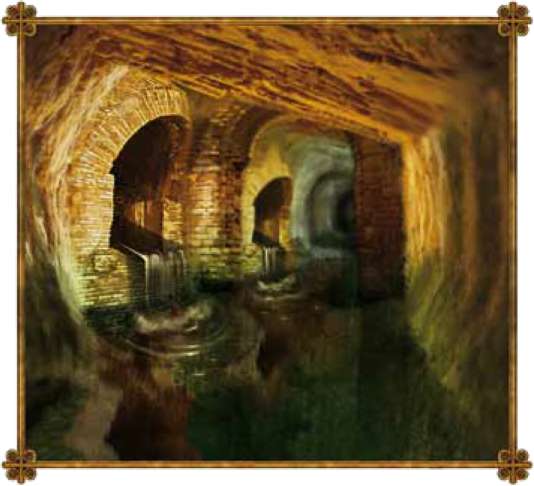
Army
If the player has both an "Army" and a "Barracks", his military may increase beyond 6.
Barracks
If a player builds a "Barracks", his military may increase beyond 3 but not beyond 6, unless he also has built the "Army".
Bouleuterion
The council chamber of a city-state. If a player has a "Bouleuterion" during Step 3 of the Upkeep phase, he may pay anyone resource cube from his warehouse to advance one of his progress markers one space. He may only do this once each round.
Colony
When a player builds the "Colony", he may advance any three of his progress markers one space each.
Delian League
The alliance of city-states led by Athens. If a player has the "Delian League" and wins a war (as the attacker), and the defender cannot pay all of the tribute that he is due, the attacker receives the rest of the tribute from the supply (he must take all of the defender's resources first, before taking any from the supply).
Example: Mandy defeats Carl in a war by 3 points, but Carl only has two fish cubes. Because Mandy has the "Delian League", she may take any one cube from the supply, in addition to both of Carl's fish cubes.
Farm
The player advances his markers on the agriculture, hunting, and fishing production progress tracks by one each when he builds the "Farm".
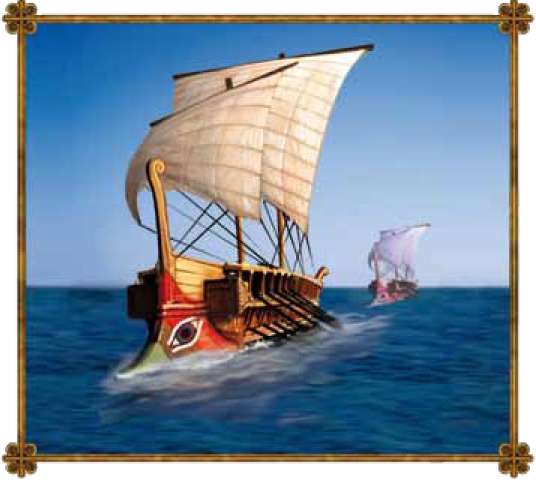
Fleet
The "Fleet" adds to its player's military value, but does not move his progress marker. So, he receives this benefit even if his progress marker could not normally advance (because he lacks the proper building or because it is already on the eighth space).
Example: Greg has a military of 3 and he has a "Fleet". Even though he does not have a "Barracks", he fights wars with a military total of 4 when he attacks any player who does not also have a "Fleet".
If a player has a "Fleet" and his priest is on Ares's α space, he does not receive both tie-breaker effects: he still only wins ties by 1 point.
Gardens
The player advances his hunting production progress marker by one space when he builds the "Gardens".
Goldsmith
During Step 3 of the Upkeep phase, the player may spend any one resource cube from his warehouse to earn 1 victory point. He may only do this once each round.
Gymnasium
A place for athletes to train for the Olympic Games. If a player builds a "Gymnasium", the minimum culture he needs to build any building is reduced by 1.
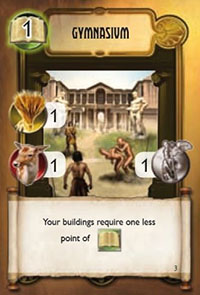
Harbor
The player advances his fishing production progress marker by one space when he builds the "Harbor".
Library
If a player has both a "Library" and a "School", his culture may increase beyond 7.
Lyceum
The school directed by Aristotle. If a player builds the "Lyceum", he advances his population and culture progress markers by one space each.
Marble Quarry
When a player has a "Marble Quarry", his cost for all buildings (common and unique) are reduced by one resource of his choice. The "Marble Quarry" does not discount its own costs (since the benefit does not take effect until after it is paid for and built).
This effect is mandatory. The player cannot choose to pay the full building cost.
Militia
The player advances his population and military progress markers by one space each when he builds the "Militia".
Oracle
When a player builds the "Oracle", he immediately receives the α favor of anyone deity he chooses. If the player chooses Apollo, he can only select his God of the Sun aspect (and gain 2 victory points). He cannot choose to cause a plague.
If the player chooses Ares and he declares war on another player, he receives the tie-breaker benefit normally granted to a priest in Ares's α space.
Parthenon
The temple devoted to Athena in the city-state of Ath- ens. When a player builds the "Parthenon", he advances his culture progress marker by one space. Also, for the rest of the game, he can use resources in his tribute area as if they were in his warehouse.
Peloponnesian League
he powerful alliance of city-states led by Sparta. When a player builds the "Peloponnesian League", he advances his military progress marker two spaces and then may declare war.
Philosophy
This card does not cost any resources, but the player still must meet the culture requirement in order to build it.
Starting with the player to the builder's left, each player in turn must declare if they want a free resource (and which one) from the supply. The builder receives an identical resource cube from the supply for each resource taken by his opponents.
The players place these resources in their warehouse. If no opponents take resources, the builder does not gain any resources from "Philosophy".
The effect of "Philosophy" is instantaneous, so all players can use the resources they get right away.
Road System
The player advances his population progress marker one space when he builds the "Road System".
School
If a player builds a "School", his culture can increase beyond 4, but not beyond 7 unless he also has built the "Library".
Statue
The player advances one of his three production progress markers one space (his choice) and advances his culture progress marker one space when he builds the "Statue".
Temple of Aphrodite
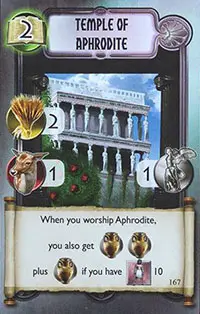
When the player worships Aphrodite (i.e., places a priest on either her α or β space), in addition to the normal favor, he also receives two resources of his choice.
If his population is 10, he receives three resources (total) of his choice.
He receives the third resource even if worshipping Aphrodite just raised his population to 10.
Temple of Apollo
If a player builds the "Temple of Apollo", he is not affected by the plague for the rest of the game.
Temple of Ares
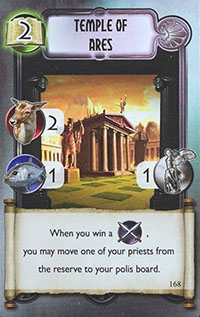
When the player wins a war, if he has any priests left in his supply, he may move one of them to his city-state sheet to use later in the round.
The "Temple of Ares" has no effect if all of the player's priests are already in play.
Remember that all priests are returned to the player's supply during the Upkeep phase, so any priests gained through the "Temple of Ares" are not permanent additions: they can only be used during the current round.
Temple of Artemis
When a player builds this building, he advances his hunting production progress marker one space and then produces meat by taking the amount of meat (red cubes) shown on the square currently occupied by his hunting production progress marker from the supply.
In addition, for the rest of the game, he can use meat resource cubes as any type of resource (meat cubes are "wild" for him).
Temple of Athena
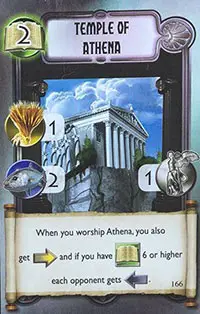
When the player worships Athena (i.e., places a priest on either her α or β space), in addition to the normal favor, he may also immediately advance anyone's progress marker one space.
If his culture is 6 or more, his opponents must each also reduce one of their progress markers one space. Remember: A progress marker on the first space of its track cannot be moved backwards.
His opponents must choose progress markers that can be moved, if possible. If worshipping Athena raises the player's culture to 6 or more, the negative effect on his opponents occurs.
But if worshipping Athena only raises his culture to 5, and he uses the benefit of the "Temple of Athena" to raise it to 6, the negative effect does not occur.
Temple of Demeter
When a player builds this building, he advances his agriculture production progress marker one space and then produces grain by taking the amount of grain (yellow cubes) shown on the square currently occupied by his agriculture production progress marker from the supply.
In addition, for the rest of the game, he can use grain resource cubes as any type of resource (grain cubes are "wild" for him).
Temple of Hades
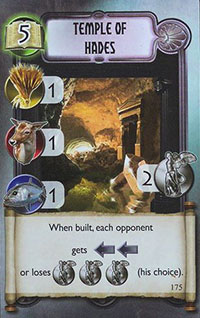
When a player builds this building, his opponents must each either move two of their progress markers backward one space each or lose 3 victory points. Each opponent chooses which penalty to suffer.
Remember: A progress marker in the first space of its track cannot be moved backward. Each opponent must choose two progress markers that can be moved backward, if possible (unless he chooses to lose 3 victory points instead).
If a player only has one progress marker that is not already on the first space of its track (and chooses the  option), he only moves that progress marker back one space and suffers no other penalty. If all of a player's progress markers are on the first space of their tracks, he suffers no ill-effects.
option), he only moves that progress marker back one space and suffers no other penalty. If all of a player's progress markers are on the first space of their tracks, he suffers no ill-effects.
If a player chooses to lose 3 victory points, but he does not have that many, he only loses the victory points he has. His score cannot go below "0", and he suffers no other effects.
This effect is instantaneous, so any player that is still waiting to gain a favor from the current deity is affected by the "Temple of Hades" before he receives his favor.
Temple of Hephaestus
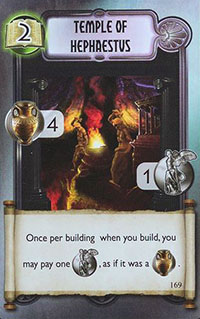
This building allows the player to spend 1 victory point as any type of resource when he builds a building.
He can only use this benefit once per building built (i.e., he cannot spend multiple victory points instead of resources for the same Building card).
The "Temple of Hephaestus" cannot discount its own costs (since the benefit does not take affect until after it is paid for and built). This effect is optional. The player can choose whether or not to use it each time he builds.
He may not spend victory points he does not have (i.e., his victory point score cannot go negative).
Temple of Hera
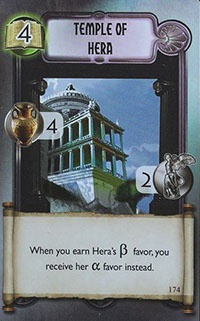
When the player receives Hera's β favor, he receives the benefit of her α favor instead.
Temple of Hestia
This building has no effects, but it is worth several victory points.
Temple of Poseidon
When a player builds this building, he advances his fishing production progress marker one space and then produces fish by taking the amount of fish (blue cubes) shown on the space currently occupied by his fishing production progress marker from the supply.
In addition, for the rest of the game, he can use fish resource cubes as any type of resource (fish cubes are "wild" for him).
Temple of Zeus

When the player receives Zeus's β favor, he receives the benefit of his α favor instead.
Tholos
A round temple sanctuary. The "Tholos" reduces the play- er's requirements to earn extra priests during Step 5 of the Upkeep phase by one each. He now only needs a population of 5 or higher (instead of 6) and a culture of 7 or higher (instead of 8).
Trade Route
During Step 3 of the Upkeep phase, the player may exchange one of his resources for the other two. This building has no effect if the player has no resources in his warehouse during Step 3 (remember that tributes do not move to the warehouse until Step 4, so they cannot be used).
The effect of the "Trade Route" is optional and may be used only once per round.
Trispastos
A crane using three pulleys. When a player builds the "Trispastos", he may also immediately build any two buildings with a culture requirement of 1. These buildings are free. The player receives all victory points for and the full effects of both buildings.
If the player has already built six of the seven buildings, he only builds the one he is missing.
If he has already built all seven, the "Trispastos" has no effect.
Well
The player advances his agriculture production progress marker by one space when he builds the "Well".
Wonder
When a player builds the "Wonder", he removes all of his priests that are on β spaces of the game board (regardless of which deity) and returns them to his city-state sheet.
He may use these priests again during this Worship phase. The effect of the "Wonder" is mandatory. The player cannot choose to leave any of his priests on β spaces of the game board.
Workshop
When a player builds the "Workshop", he chooses one of the following benefits: he advances his military, agriculture, hunting, or fishing progress markers by one space, or he produces resources of any one type, or he earns 1 additional victory point.
If he is the first player to build a "Workshop", he chooses two different benefits from the list instead of only one.
Continue Reading
